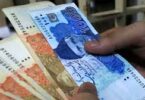LONDON (AFP): The pound rallied and UK government bond yields rose Wednesday, with the Bank of England accused of fuelling markets uncertainty.
The BoE said it would Friday end a short-term programme of bond-buying support aimed at quelling volatility triggered by a debt-fuelled UK budget.
The Financial Times earlier said the BoE stood ready to intervene further.
On Wednesday, the yield on the government’s 30-year bond returned above a relatively high level of five percent. The UK government’s higher borrowing costs are a reflection of market unease regarding the affordability of upcoming tax cuts aimed at supporting Britain’s recession-threatened economy.
The pound rose against the dollar as traders bet on more aggressive interest rate hikes from the BoE on concerns the budget of uncosted tax cuts would further fuel sky-high UK inflation.
“Markets have gyrated overnight and this morning, following seemingly conflicting messages purportedly from the Bank of England in relation to the time-line of the current temporary UK government bond purchases,” noted BNP Paribas analyst Chris Lupoli. London’s benchmark FTSE 100 index dropped slightly, with sentiment dampened by news that the UK economy unexpectedly shrank in August.
Investors are struggling to find some solace as they navigate a range of crises that threaten the global economy, from soaring prices and bumper interest rate hikes to the Ukraine war and China’s Covid-induced growth slowdown.
The gloom was summed up by the International Monetary Fund, which on Tuesday highlighted the risks of inflation and the conflict in Europe as it slashed its global growth forecast and warned: “For many people 2023 will feel like a recession”.
Later, US President Joe Biden admitted there was a chance the country could suffer a “slight” recession.
Investors are now nervously looking ahead to Thursday’s US inflation report, with observers warning that a strong reading could spark another rout on markets.
Even if it showed inflation cooling from a four-decade high, analysts said the Fed would not likely take the single reading as reason to slow down its pace of rate hikes.
Aggressive US rate hikes pushed the dollar to a 24-year high against the yen Wednesday, also as Japan’s central bank holds off from hiking its own borrowing costs.






